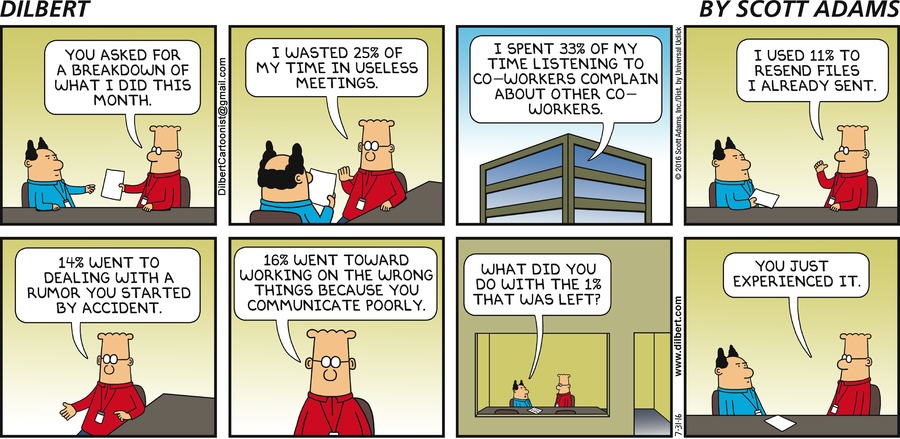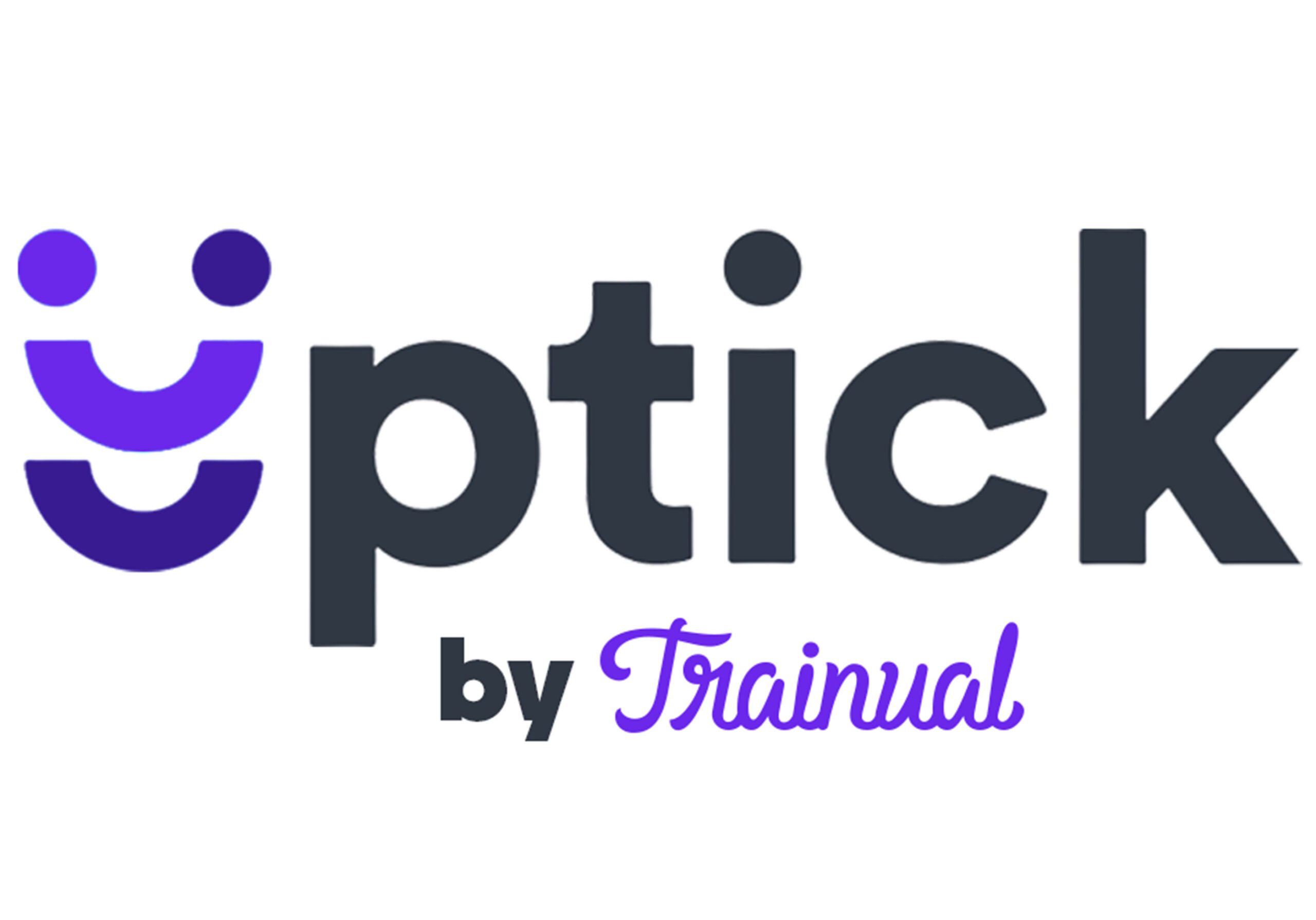I’m sure you know people who have one-on-one meetings with their boss or with their team – maybe you have them yourself. Chances are you’ve heard some people talk about how much they’re a “time suck.” Sure, some folks have had a good experience, but most will tell you one-on-ones are not worth their time.
From what I’ve seen, the difference between those two points of view will stem from misunderstanding the primary benefits of conducting one-on-ones.
Here’s what’s happening during the one-on-one meetings people hate:

Dilbert hits a little too close to home for some one-on-one meetings I’ve had, and I was the person running them! If only I knew then what I know now – I could have saved a lot of wasted time and missed opportunities.
All is not lost, though. Since digging into what makes a one-on-one meeting tick (and asking my team what they want to get out of the time), our one-on-ones have never been better.
So here are the ultimate reasons we focus on one-on-one meetings – making sure they have impact and are worth the time to schedule, prep, & conduct.
1. One-on-ones break down walls and build trust between managers and employees.
Many movies and televisions shows reinforce our view of bosses. Mainly, that they’re mean, have little or no clue (or care) about their employees and that they’re completely unapproachable. They almost always look scary. Funny thing is, a recent Harris poll found that 69% of managers are actually uncomfortable talking with their employees! Managers are the ones that are scared!
And if that doesn’t hinder employee/manager communication enough, consider a recent poll finding that given the choice, 58% of employees would trust a complete stranger before they would trust their boss. Yikes.
Fear and distrust – we clearly have a relationship problem.
If there is anything I have learned in 30+ years of leadership, almost 27 years of marriage and the raising of 4 children, it’s that where there is no communication there can be no trust. One-on-ones with a little structure can help build the kind of relationships that make work a productive, meaningful and fun place to be. Here are a few guidelines to help managers break down the walls that separate them from employees:
- Ask questions about their professional dreams and aspirations. (When you build trust, you can also ask about personal dreams.)
- Listen to their answers, and if possible, use your platform as a manager to help them achieve their goals.
- Seek to understand before seeking to be understood.
- Focus first on solving their problems. If you do that, solving yours will be easier!
- Try to understand each person as an individual, and avoid a one-size-fits-all approach.
People love being known and appreciated for their uniqueness. It’s been my experience that when I take the time to meet regularly with my staff, even if it’s for only 15 minutes a week, the walls of distrust and fear inevitably come down and a foundation of trust starts to build.
Would you like to boost productivity, increase trust and have a healthier, happier team?
Download your FREE 1:1 guide now!
2. One-on-ones help everyone get on the same page
Like most managers, when I first started managing people, I had the best of intentions. I wanted to set goals that would help the company do important things, and I wanted my staff to feel fulfilled as they accomplished big, important things. At the beginning of the quarter we would lay out team and personal goals, and most everyone would leave the room thinking, “We’re going to do important things!”
Then life happened.
The tyranny of the urgent
No sooner had people left the room than the tsunami of “I need this right now” and “I’ll start on those goals as soon as I finish this other thing” hit. The staff were working hard, but it didn’t feel like we were going anyway – we were just chasing whatever seemed urgent at the time. Before we knew it, the end of the quarter would come and we realized the last time we talked about our big goals was the day we wrote them on the white board.
Regular, structured one-on-ones can change that. In my case, the questions I ask include goals in every one-on-one. It’s very hard to forget what we decided when we talk about it every week, and if changes need to be made, they are made intentionally and in collaboration with my employee.
So in this portion of our weekly one-on-ones, we seek to:
- Clarify goals
- Set priorities (and inspect “How did we do?” every week)
- Discover important issues
- Encourage and correct
Talking with my staff on a weekly basis has literally changed my business life. I rarely wonder, “What does Jim actually DO?”, and I can see the holes in our plans much more readily. And the bonus? I often get insightful input from these folks, because they have their feet on the ground and have thought through how to solve some important problems. If you’d like to learn more about how this helped me, check out this post.
3. Keep your finger on the pulse of your culture
The Clueless Boss. From the time I started working in high school I was familiar with the concept of the clueless boss. Most employees have. “He has no idea what I do, and probably no idea what we’re all supposed to do.”
Ok, so it’s not usually that bad, but I have to admit to some clueless moments myself. And I wasn’t clueless because I didn’t care, but because I was too busy to ask the right questions. One-on-ones have been a HUGE help to me here.
Understanding what my people do, what motivates them, when and how they are most productive and how to remove critical obstacles to their productivity has helped me understand my company culture.
One-on-ones help me see when the team is enthusiastic, when they’re exhausted, or when there is a gray cloud over the team. The meetings allow me to give individualized attention to each staff member, which helps them feel known and served.
Keep your best people
Regular one-on-ones are a HUGE benefit when thinking about retaining your best staff! Statistics show that highly engaged employees are 87% less likely to leave their companies than their less-engaged counterparts.
Here are some of the issues we discuss in our one-on-ones that help me get a feel for my staff and my company:
- We talk about values and virtues I want to see them exhibit.
- I ask about their team’s health, and how they have impacted their team.
- We talk through personal and professional development.
- We talk about ways I can help them.
- I ask when and how they were most productive, so we can put together a plan to make that the normal scenario.
- I solicit their feedback about the job I am doing (scary, but I do get some interesting, helpful comments)
If you’ve done a good job building trust, these meetings can be your most valuable resource in creating the kind of department/company culture that people love and work hard to maintain. When done regularly, the meetings can be held in 15-20 minutes. It’s a small price to pay for the benefits, as ultimately it makes life better for employees AND managers!
Download your FREE Ultimate Guide to 1:1s
Learn how to have productive and meaningful conversations and boost productivity, increase trust and have a healthier, happier team!



